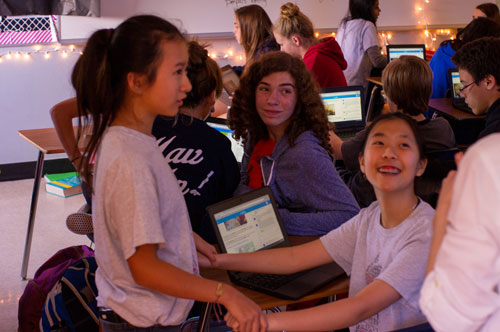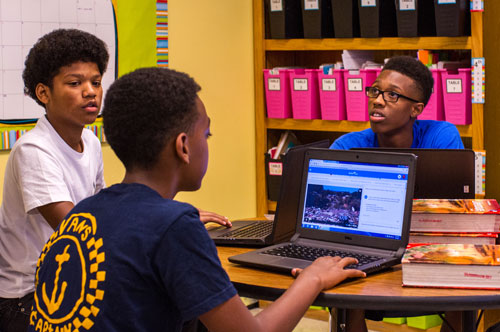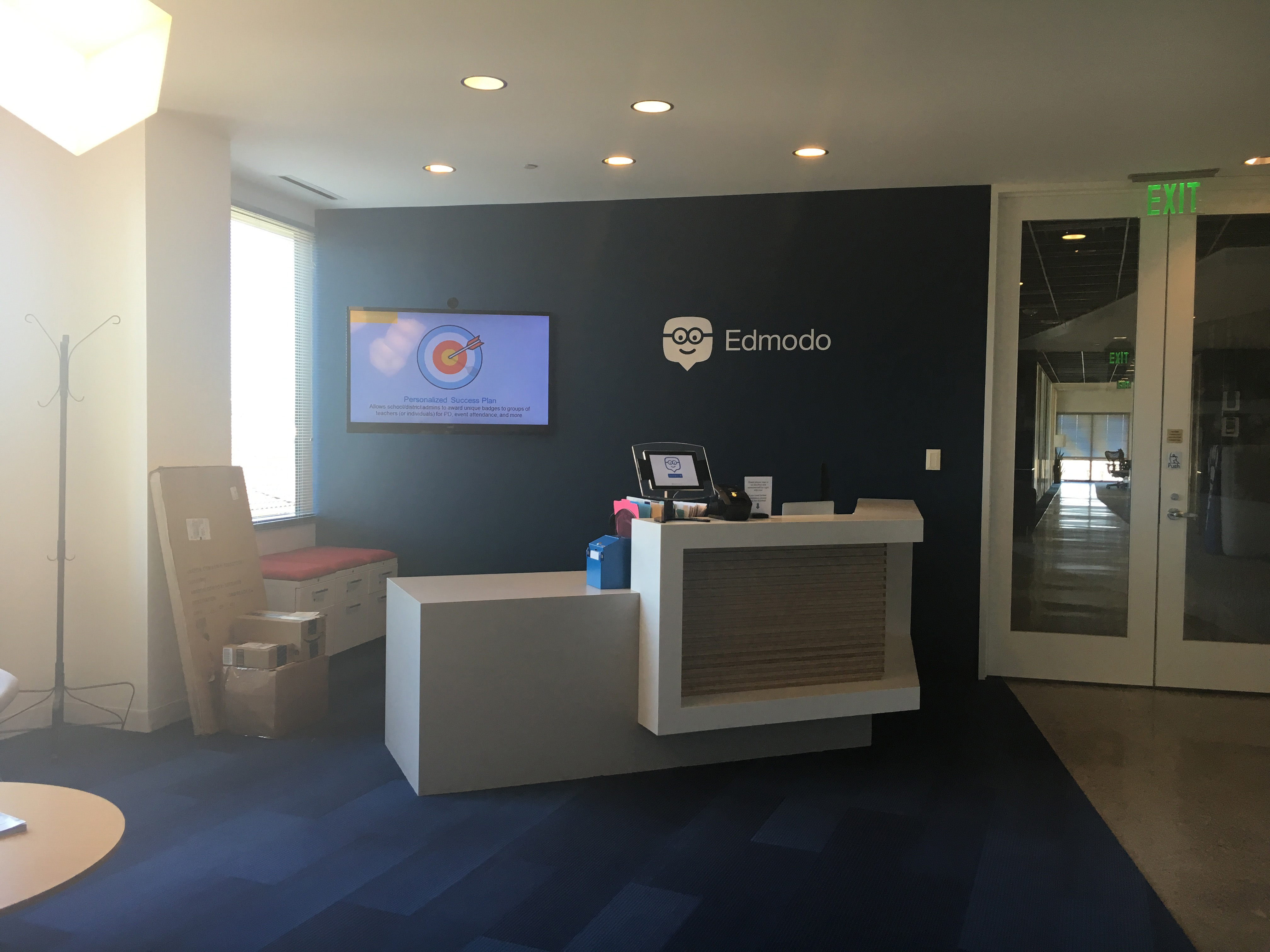“For students who have never had the opportunity to travel outside of their town or country, this kind of collaborative learning experience can be completely transformative.” – Joe Troyen
An opportunity to learn about other cultures and ways of life directly from one’s international peers themselves seems like an obvious way to nurture global competencies. So, where’s the app and when can classrooms get started?
Joe Troyen is the Founder of PenPal Schools, an organization that connects over a quarter million students from 150 countries to learn together through collaborative online projects. Everything from human rights to environmental sustainability to literature to robotics is built into the curriculum enabling students to study with classrooms around the globe and develop a range of skills including reading, writing, digital literacy, and intercultural competence. Troyen first started to think about his enterprise when he was in college studying Spanish and was unable to find someone to practice the language with. Years later he teamed up with a friend working at NPR and they came up with the idea of “connecting students to share perspectives on current events.” They created an app with a “news-focused curriculum” and discovered that teachers were interested in trying it out. They quickly learned that the real value in their app was “providing students with an authentic audience, which increased their engagement in what they were learning.” Feedback from teachers indicated that students were “extremely motivated” to read the texts and write persuasive answers because, for the first time, they were writing to a real person and not just their teacher.
The Global Search for Education is pleased to welcome Joe Troyen to talk about what’s next for PenPal Schools (recognized by President Obama as one of the world’s leading social enterprises.)
“So far, we’ve connected 326,000 students from over 8,000 schools in 150 different countries.” – Joe Troyen
Joe, how has e-learning evolved since you started PenPal Schools in 2012? What differences have you seen in the way classrooms use modern tech today to enhance learning versus when you started out?
Since 2012, we’ve continued to learn a ton from teachers, and PenPal Schools has evolved from a simple platform to share perspectives on current events into a global project-based learning community where students can collaborate on all kinds of topics. This follows a trend we’ve noticed in global education across the board. Teachers used to be interested in connecting globally to bring more global awareness into their classroom, but now teachers are more excited about connecting globally to collaborate, create, and deepen the learning experience for students. Teachers see value in global connections in classes that they might not have before, such as science and math.
How does your program narrow the “global skills gap” and the “global citizen gap”?
Global citizenship includes a lot of the skills that teachers are always focused on, even in traditional classrooms: communication skills, like reading and writing, digital citizenship, and social and emotional skills. However, students still learn in a traditional model where their communication hardly ever extends outside of the classroom. On PenPal Schools, students can practice global skills authentically by connecting and collaborating with peers from around the world in a safe digital space. For students who have never had the opportunity to travel outside of their town or country, this kind of collaborative learning experience can be completely transformative.
“At PenPal Schools, we believe that learning is better together.” – Joe Troyen
Let’s say a teacher wants to implement your program into their curriculum. How do they get started?
It’s so easy for teachers to get started on PenPal Schools. First, teachers visit www.penpalschools.com to sign up and select a topic for their students to explore. With over 40 topics available related to science, history, English language arts, math, art, foreign languages, and more, there is something for every teacher!
Once teachers select a topic, they invite their students to join. Students also sign up at www.penpalschools.com and join the topic using their teacher’s unique classroom code. Once students have joined the topic, they can begin exploring lessons and connecting with PenPals.
One of the most popular topics on PenPal Schools is World Explorer. It’s a great first topic for new teachers! This helpful flyer can also help teachers get started.
How much student choice and student voice is built into your program for classrooms?
When teachers and students join a topic, they’ll find lessons, project options, and materials organized and ready to go. Students choose their own project option and self-navigate through the lessons. Students also have a lot of choice when it comes to their PenPals! Through global student forums, students can search for specific countries to connect with, as well as choose their own PenPals.
Last year, a PenPal from Kentucky participated in Holidays & Festivals of the World and designed her own holiday: Everybody Matters Day. She got the support of other schools in her area to help advocate to her mayor, who signed an official proclamation making February 14, 2018 ‘Everybody Matters Day!’ PenPals around the world celebrated that day, too! Learn more about Everybody Matters Day here.
What are the biggest challenges you’ve faced in this program and how would you describe your achievements to date?
We are proud of the size of our community, which has grown thanks to teacher recommendations and word of mouth! So far, we’ve connected 326,000 students from over 8,000 schools in 150 different countries.
One of the biggest challenges we’ve faced is administrator buy-in. It’s easy for teachers to get excited about PenPal Schools, but when principals just hear the name and don’t take a closer look, they may not think it’s worth the class time. That’s why we’ve really made learning the focus of everything and aligned all content to academic standards.
How are you planning to build/develop PenPal Schools in the next 10 years? What are your key goals?
At PenPal Schools, we believe that learning is better together. In 10 years, I hope that all students will have the opportunity to connect and learn with PenPals, both at school with their teachers or at home with their parents. This means continued growth in schools around the world and the development of a new parent app.
Wow – we can’t wait to see it. Thanks Joe.
C M Rubin and Joe Troyen
Thank you to our 800 plus global contributors, teachers, entrepreneurs, researchers, business leaders, students and thought leaders from every domain for sharing your perspectives on the future of learning with The Global Search for Education each month.
C. M. Rubin (Cathy) is the Founder of CMRubinWorld, an online publishing company focused on the future of global learning and the co-founder of Planet Classroom. She is the author of three best-selling books and two widely read online series. Rubin received 3 Upton Sinclair Awards for “The Global Search for Education”. The series which advocates for all learners was launched in 2010 and brings together distinguished thought leaders from around the world to explore the key education issues faced by nations.
Follow C. M. Rubin on Twitter: www.twitter.com/@cmrubinworld









Recent Comments